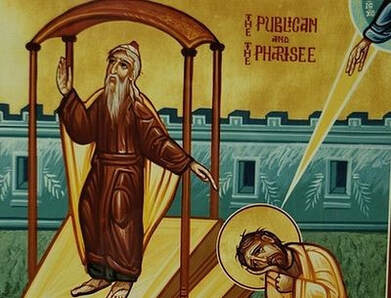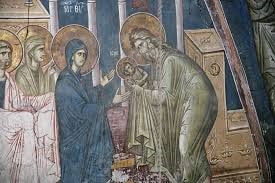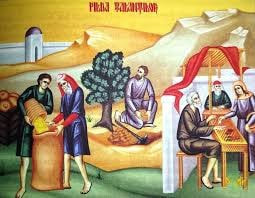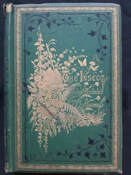 It is remarkable that Our Lord is never, or hardly ever, the subject of abuse. Many will disregard his teachings or fail to believe but usually they show respect. This is not surprising because Christ proclaims truth and within everyone, made in the image of God resides an understanding of truth, alongside understanding of right and wrong. As we move towards Great Lent, now only four Sundays away, it is worth emphasising that Lent is about the discovery of truth. In our self-evaluation, we discover the truth about ourselves. Today, as we consider the parable of the Publican and the Pharisee, there is a challenge of two questions, “Am I more like the Pharisee or am I more like the Publican?” The key aspect of the Pharisee is that he ‘stood and prayed with himself’, glad that he was not like other men, pleased that he was good living, fasting twice each week and generous in the tithes he gave. The key aspect of the Publican was that he ‘stood afar off and would not so much as raise his eyes to heaven but beat his breast, saying, “God, be merciful to me a sinner!” We have to take pride in ourselves and be glad that we pray, fast and express the gifts of the Holy Spirit, ‘... patience, kindness, goodness....’ We should also be glad that we are generous to others. But we also have to seek the truth within ourselves and our behaviour to be sure that pride is not blinding us and keeping us away from change and from God. We have to be sure that there is always a call for God’s mercy - corrective loving kindness. Are we more like the Pharisee or the Publican? Probably a mixture of both and our Lenten journey will help us sort this out. Great Lent is not only of repentance as an evaluation of sinfulness but also of joy as we discover the truth within us. We seek to be master of our passions, so that we have within us the restored divine likeness in our soul. The restored divine likeness in our soul! May God give His Blessing. Fr David
0 Comments
 On 15th February, on the Old Calendar, we celebrate the Feast of the Meeting of Our Lord in the Temple. This is known in the West as the Presentation in the Temple. According to the Law of Moses, every firstborn male was to be presented in the Temple on the fortieth day after birth and Jesus’ parents did this in obedience as required. The Meeting, however, has a much more profound meaning; the newly born Jesus met the Elder Simeon in the Temple on this day. Simeon had been told by God that he would not see death until he had seen the Lord’s Anointed. He must have received many presented boys over the years, but he knew that this one was not only special, but very special. Indeed, he recognised him as the very one he was waiting for, the Son of God, The Lord’s Anointed. In his delight, he cried out the beautiful hymn which we sing at vespers every day; “Lord, now your servant can depart in peace for (because) my eyes have seen Your Salvation! As he held the child Jesus in his arms, he was further able to say, “(This child) is a light to enlighten the Gentiles and to be the glory of Your people Israel”. This was a Theophany, a revealing of God. Jesus’ birth had been a rather private affair, witnessed only by Mary his mother, Joseph, probably a ‘midwife’ and some of Joseph’s, and, perhaps, Mary’s relatives. Then there were shepherds and much later, Wise Men from the East, but this for others, was a birth amongst births of no special note to the general population at the time. Now at the 40th day, in the Temple, the Theophany is more in the public eye and word of Simeon’s acclamation would have spread about. This Theophany was also witnessed by the prophetess Anna, who had been constantly at prayer in the Temple for many years. Simeon not only said, “Now mine eyes have seen Thy Salvation which Thou hast prepared before all people, a light to enlighten the Gentles and to be the glory of thy people Israel”. He proclaimed a great message for us; the child in the arms of Simeon, “a light to enlighten the Gentiles”, is for us, as we welcome the Lord Jesus into our arms, that we too maybe enlightened. This is the truth revealed by the Canaanite woman. She, a Gentile, had heard of Jesus and now came to him to ask him to help her daughter. Initially, he challenged her, ”I have only come to the lost sheep of Israel (“to be the glory of Israel “), It is not right to give the children's food to dogs”, The Canaanite woman was not insulted by this but accepted the challenge in humility, saying with great faith, “Even the dogs eat the crumbs from the Master’s table!”. She was implying, she would willingly be a dog to feast on the crumbs which Christ might drop” To this, Our Lord acknowledged her profound faith and for the first time (according to the record) reached out to a Gentile to bring healing for her daughter and enlightenment. This is why the Meeting in the Temple supported by this encounter with the Gentile woman is, for the Orthodox Church, a much more profound understanding than simply a record of Our Lord’s, through his parents, acquiescence to the Law of Moses. In the West, and particularly according to an old English custom, this Feast is also known as Candlemas. At the end of the Liturgy on this day, we processed around the inside of the Church with lighted candles, symbolising the Light of the World. Whilst doing this, we sang the hymn. Blest are the pure in heart, for they shall see our God; the secret of the Lord is theirs, their soul is Christ’s abode. It is, as in the Beatitudes, the pure in heart that see our God. With this purity to which we all aspire, we are led to understand His secret, a secret only revealed to those who truly seek Him. Then, our soul can be filled with Christ our Lord, as we hold him close to us as did the Elder Simeon on this great Feast which we celebrate today. For Christ is the Light to enlighten the Gentiles as we draw close to Him. Fr David  I have recently discovered an old book that I would like to commend to you. "The Insect", published in 1875, is one of four remarkable works in which the late Jules Michelet embodied the results of a loving and persevering study of Nature. These works are absolutely unique; the poetry of Science has never before illustrated on so large a scale, or with so much vividness of fancy, or in so eloquent a style. The aspects of Nature were never before examined with so strong an enthusiasm or so definite an individuality, —with so eager a desire to identify them with the feelings, hopes, and aspirations of humanity. The author approaches his subject neither as philosopher nor as poet, but yet with something of the spirit of both. His philosophy and poetry, however, both subordinate to his ardent sympathy with what he conceived to be the soul, the personality of Nature. Let me show you what I mean… "…. the ants toiling in the sand, the quarrymen working in the sandstone. Both are of the same race; the men are ants on the surface, and the ants are men below. I admired the resemblance in their destiny, in their laborious patience, in their admirable perseverance. The sandstone is a very refractory and rebellious substance, and often splitting badly, subjects the poor workmen to severe disappointments. Those especially who are forced by a protracted winter to return to the quarry before the end of the bad weather, find the hard and yet porous blocks excessively damp and half frozen. As a result, they have numerous ill-wrought stones, and a mass of waste. However, they do not lose their courage; and without murmuring recommence their painful toil." We really only need read the scriptures and listen to our Lord’s teachings to see how much we can learn from nature and the world around us. I think it was Sir Frances Bacon who wrote, “God has, in fact, written two books, not just one. Of course, we are all familiar with the first book he wrote, namely Scripture. But he has written a second book called creation.” Despite being a veritable repository of wisdom, ‘The Book of Proverbs’ is not a book we tend to quote, or refer to, very often. One of my favourite passages is Proverbs 6:6 ‘Go to the ant, you sluggard! Consider her ways and be wise.’ Throughout the scriptures our Lord commands us to ‘watch’ and to ‘work’. Indeed, in our gospel reading for this Sunday we read how our Lord praises those who multiply their given talents and condemns the slothful who bury their talents. In our Epistle reading St Pauls begins “We then, as workers …” and goes on to refer to ‘labours’ and ‘patience’, as does Michelet. Michelet refers to the ‘painful toils’; St Paul speaks of ‘tribulations’ and ‘tumults’. How sad for us that we need to be directed to emulate the example of an ant, an irrational creature. Since the leave-taking of Theophany, each of our Sunday gospel readings has been preparing us for the approach of Great Lent (15th March) and today’s gospel reading is no different. We are reminded that we have work to do! We are preparing to embark on a journey, a pilgrimage: with much work to be done as we turn (repent) and refocus on our spiritual life. We must not allow ourselves to be slothful. We can hardly find a better example of why we should not be lazy or procrastinate in prayer and spiritual work than by this example, given to us by St. Ephraim the Syrian: “Once a brother was inspired by the devil to think: ‘Give yourself rest today and tomorrow rise for vigil.’ But he answered the thought, ‘Who knows, perhaps, I will not even get up tomorrow, that is why I need to rise today.’ Before work, he was also inspired with this thought: ‘Give yourself rest today and complete your work tomorrow.’ And again, he responded, ‘No, I will complete my work today, and the Lord will take care of tomorrow.’” St. Anthony teaches: “Before the dawn of each day, arrange your life as though it is your last day on earth and you will protect yourself from sins.” St. Nikolai Velimirovich tells us that, “Slothfulness is one of the deadly sins, for it deadens the soul in man. A slothful soul is a nest of vices; a slothful soul is a habitation of the devil. O Lord Almighty, Thou Who, at the same time, art all peace and all work, deliver us from destructive slothfulness and move us by Thy Holy Spirit toward all good works, for the sake of the salvation of our souls.” Fr Julian |
Parish Blog
This mainly contains homilies and messages from our priests, although there is some scope to share thoughts and interesting articles which we may want to share with others Archives
October 2022
Categories |


 RSS Feed
RSS Feed